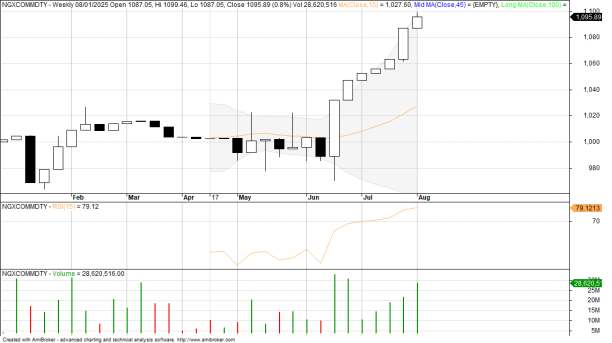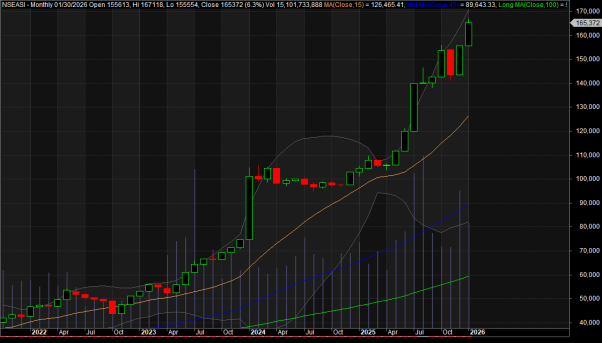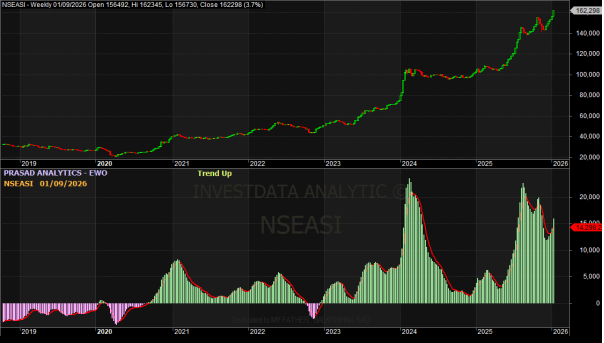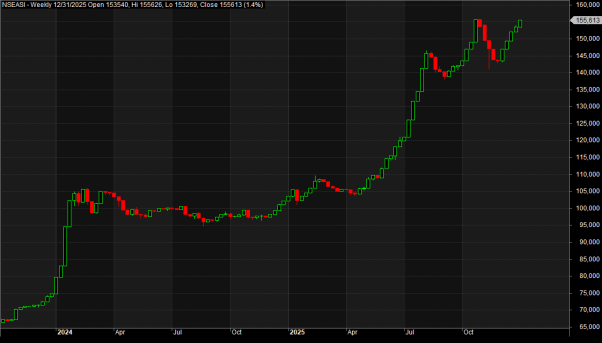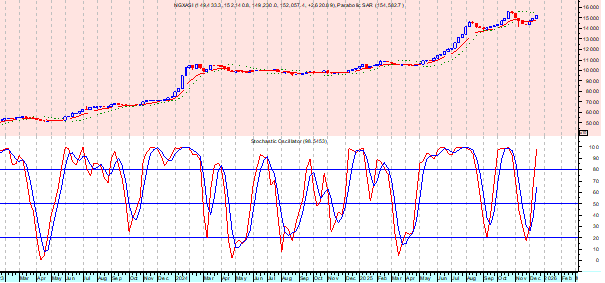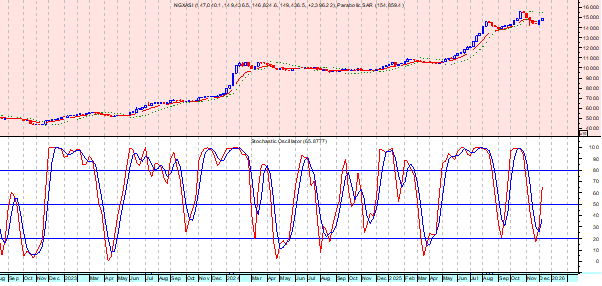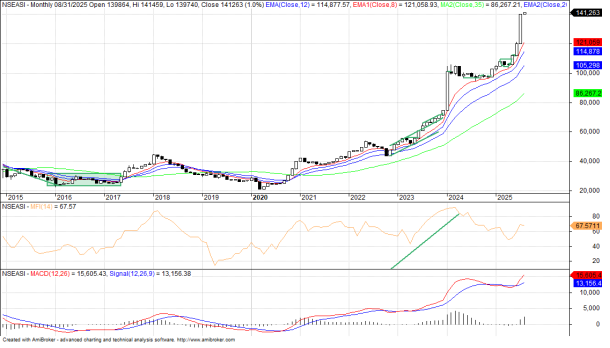
The Nigerian stock market extended its bullish trend throughout the month of July, after recording 21 straight days of bull ascendance buoyed by strong corporate earnings and soaring investor confidence. Also, position taking in heavyweights and blue-chip stocks weighed on the benchmark indicators which closed higher for the month and week, despite the seeming profit taking in some of the stocks that recently rallied on sentiments rather than fundamentals.
The NGX All-Share Index recorded 16.56% and 5.07% gain for July and the week respectively, following price appreciation by stocks of different classes, pushing the index’s action to breakout various psychological lines on a huge traded volume for the respective periods. This revealed the overbought state of the NGX in a very high volatile trend that sends mixed signal of panic selloff, or early exit from winning trades.
At the current stage of the Nigerian market, it is easy to get caught up in a market like this where momentum is strong and breakouts everywhere. Even some of the weakest stocks are on the rise. However, if you have followed Investdata all these years and months, you should know how these stories and movement tend to end, especially when fundamentals are ignored and risk gets brushed aside.
Price is king as we have always said, but it can equally fool anyone if care is not taken, or cautioned applied because all eyes are on price or index action. Price is the last thing to move, what moves first is what Investdata calls Money Flow. When you can track every naira and kobo flowing into and out of a particular stock, or sector in real time you can spot reversals and continuations of trend before they happen.
During the week market capitalisation surged by ₦3.91trn to ₦89.37trn, while year-to-date return increased by 37.25%, as several stocks hit new 52-week highs, including ROYALEX, UACN, BETAGLAS and others. Sentiment was largely positive early in the week, though it dipped by Friday with more losers than gainers. Trading volumes fluctuated, peaking at 1.11bn units, with FIDELITYBK leading in volume and MTNN in value.
NGXASI Weekly Chart
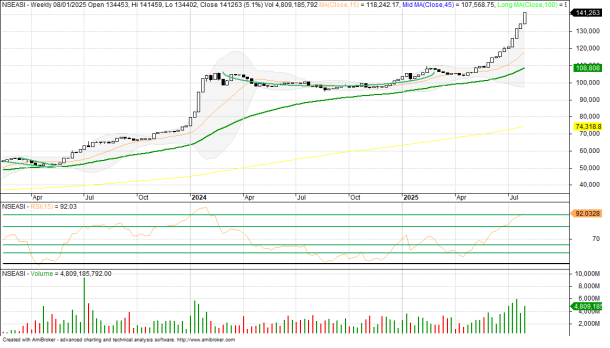
Week-to-date, the All-Share Index has advanced by 5.07%, with the NGX 30 rising 5.13%. The Banking Index posted a gain of 3.49%, the Pension Index climbed 4.37%, the Insurance Index fell by 1.22 %, and the Consumer Goods Index added 2.72%. Oil and Gas Index decreased by 0.48%.
NGXASI Monthly Chart
On a year-to-date basis, the All-Share Index is up 37.25%, while the NGX-30 has gained 36.03%. The Banking Index surged 49.27%, the Pension Index jumped 52.94%, the Insurance Index rose 23.53%, and the Consumer Goods Index posted a robust 71.89% increase. However, the Oil and Gas Index declined by 10.16%. Market breadth remained positive with 54 stocks advanced and 49 declined.
Market Outlook & Caution:
The market remains technically strong, with the NGX All-Share Index breaking through key psychological levels and trending well above its 20- and 50-day moving averages. Relative Strength Index (RSI) readings on key stocks suggest the broader market is approaching overbought territory, especially among high-flyers like UACN and DANGSUGAR. While short-term corrections are possible, especially as earnings season winds down for structural factors like sector rotation into fundamentally solid companies, continued retail and institutional demand, and improving earnings outlooks could support the next leg of the rally.
Caution:
Profit-taking and macro risks such as inflation, forex instability, and fiscal tightening could introduce near-term volatility, particularly in underperforming sectors like Oil & Gas and Insurance
UACN Weekly Chart
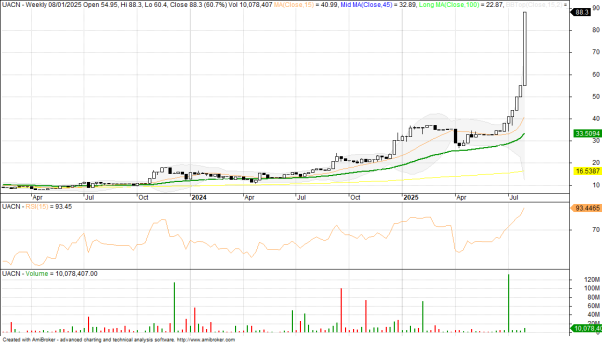
Leading the top gainers charts is UACN Plc, a diversified company involved in key sectors of the Nigerian economy, including packaged food and beverages, paints, animal feeds, and quick-service restaurants. which opened at N54.95 and closed at N88.30, gaining N33.35 or 60.69%. Mecure Industries Plc rose from N11.20 to N15.85, adding N4.65 or 41.52%, while Custodian Investment Plc appreciated by N8.50 or 27.87% to close at N39.00 from N30.50. Veritas Kapital Assurance Plc moved from N1.13 to N1.39, up by N0.26 or 23.01%, and Tripple Gee and Company Plc climbed from N3.51 to N4.30, adding N0.79 or 22.51%.
Abbey Mortgage Bank Weekly Chart
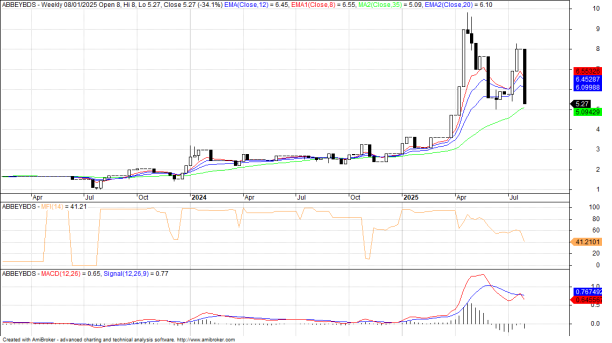
On the decliners’ side, Abbey Mortgage Bank, a Nigerian primary mortgage bank headquartered in Lagos, operating under a license from the Central Bank of Nigeria since 1992, lost N2.73 or 34.13% from N8.00 to N5.27. FTN Cocoa Processors Plc fell from N7.24 to N5.77, losing N1.47 or 20.30%. Cornerstone Insurance Plc shed N0.79 or 15.99% to close at N4.15 from N4.94. Nigerian Aviation Handling Company Plc shed N17.70 or 15.13% to close at N99.30 from N117.00, while The Initiates Plc fell by N2.38 or 14.76% to end the week at N13.75 from N16.13.
Trending in the Economy: President Tinubu has hailed Nigerians in the diaspora for remitting $20.93bn in 2024—four times the nation’s FDI. Speaking through SGF George Akume at the 2025 National Diaspora Day, he highlighted their contributions to sectors like health, ICT, housing, and education. IOM’s Sharon Dimanche emphasized their role in global innovation, noting that Nigeria received 37% of Sub-Saharan Africa’s remittances, up 8.9% from 2023. NiDCOM’s Abike Dabiri-Erewa called them “pacesetters,” citing key diaspora initiatives.
Meanwhile, Nigeria’s FX gain revenue plunged 73% to ₦589.45 billion in H1 2025 as budget rates aligned with market realities, ending arbitrage gains. FX revenue now accounts for just 6% of FAAC allocations, down from 31% in 2024. Still, total FAAC disbursements rose 35.6% to ₦9.72tr, showing a shift toward non-FX income. Subnational governments face tighter fiscal space, though the Federal Government retained most FX proceeds.
Global Market and Oil: Global equities fell sharply Friday after disappointing U.S. jobs data triggered recession fears and spurred bets on a September interest rate cut. MSCI’s global index dropped 1.32%, or 12.23 points, to close at 917.39—its steepest single-day decline since mid-April.
The U.S. economy added only 73,000 jobs in July, far below the forecast of 110,000, while June’s figures were revised dramatically lower from 147,000 to just 14,000. Following the report, President Donald Trump fired Bureau of Labor Statistics Commissioner Erika McEntarfer, intensifying political tensions. Markets were further shaken when the Federal Reserve announced that Governor Adriana Kugler would resign early on August 8, raising concerns about the Fed’s independence at a time when Trump has repeatedly criticized its rate policies.
Traders reacted swiftly, with CME FedWatch showing a sharp rise in expectations for a September rate cut to 87.5%, up from 37.7% a day earlier. Wall Street slumped in response. The Dow Jones Industrial Average fell 542.40 points or 1.23%, closing at 43,588.58. The S&P 500 lost 101.38 points or 1.60% to close at 6,238.01, marking its worst day since May 21. The Nasdaq Composite slid 472.32 points or 2.24% to end the day at 20,650.13, its steepest fall since April 21. Earlier in Europe, the pan-European STOXX 600 index ended down 1.89%, its worst performance since April 9.
Amazon shares tumbled over 8% after its earnings report revealed slower-than-expected growth in its cloud business, adding to broader market concerns. The global risk-off sentiment intensified following Trump’s announcement of sweeping new tariffs on several trading partners. He raised tariffs on all Canadian imports not covered by the USMCA to 35% from 25%, imposed a 25% tariff on Indian exports, 20% on Taiwan’s, 19% on Thailand’s, and 15% on South Korean goods. Mexico was given a 90-day reprieve to negotiate terms and avoid immediate tariff hikes.
In the currency markets, the dollar reversed earlier gains and dropped sharply as expectations for monetary easing grew. The dollar index fell 1.37% to 98.66. The euro rose 1.52% to $1.1589, while the dollar fell 2.26% against the Japanese yen to 147.32. Market analyst Juan Perez of Monex USA said the dual news of Kugler’s resignation and McEntarfer’s firing would be interpreted as “very dollar-negative,” warning that any erosion of Fed independence could lead to further dollar declines.
U.S. Treasury yields plunged amid the weak jobs report and heightened rate cut expectations. The benchmark 10-year yield fell 14 basis points to 4.22% from 4.36% the day before. The 30-year bond yield dropped 6.4 basis points to 4.8211%, while the 2-year note yield—sensitive to Fed policy—sank 26.1 basis points to 3.69%.
Commodities also reacted sharply. U.S. crude fell $1.93 or 2.79% to settle at $67.33 a barrel, while Brent crude dropped $2.03 or 2.83% to $69.67, as investors weighed weaker economic signals and a potential output hike by OPEC+. Gold surged as investors sought safe-haven assets, with spot prices climbing 2.14% to $3,360.45 an ounce, hitting a one-week high.
Sectorial Charts For the Week
NGX Banking Index Chart
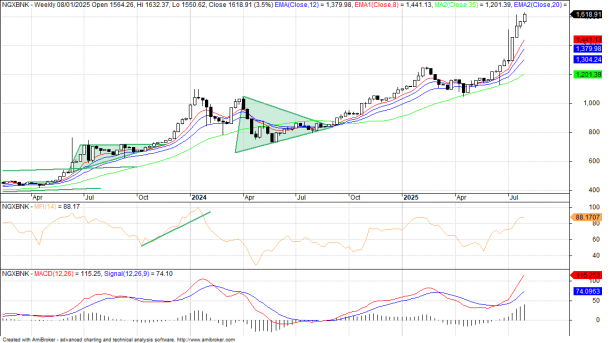
NGX Insurance index Chart
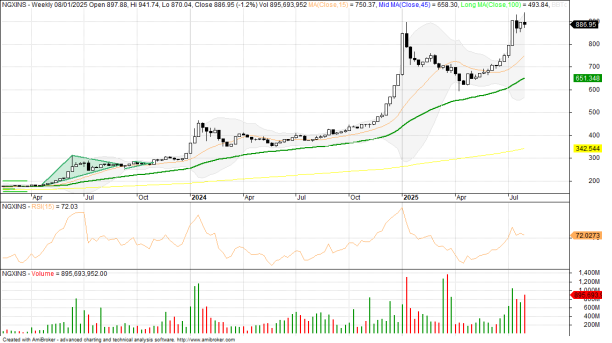
NGX Consumer Goods Index Chart
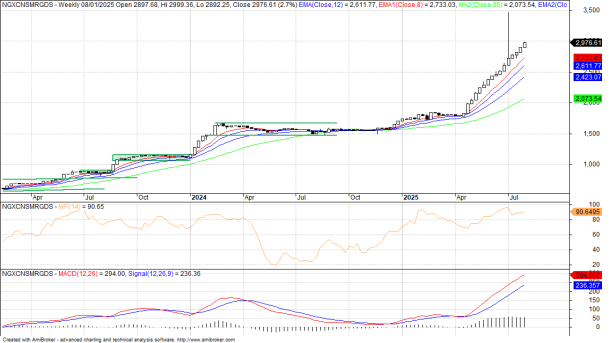
NGX Industrial Goods Chart
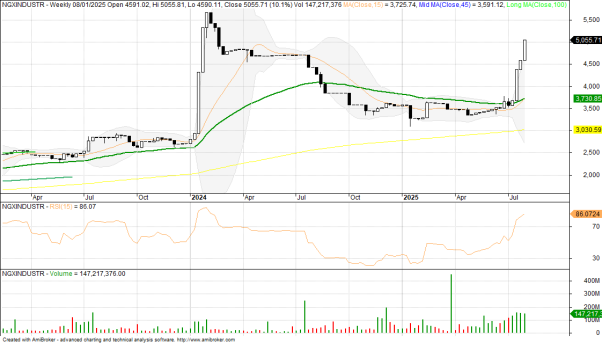
NGX 30 Index Chart
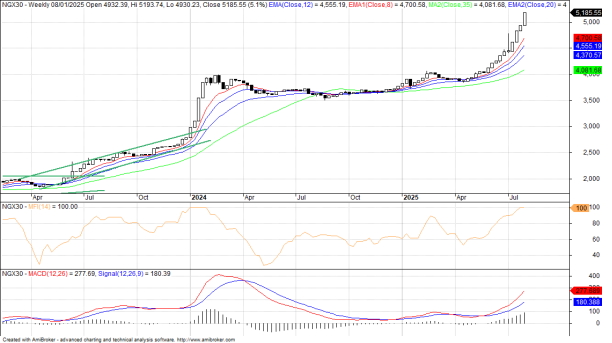
NGX Commodity Index Chart
